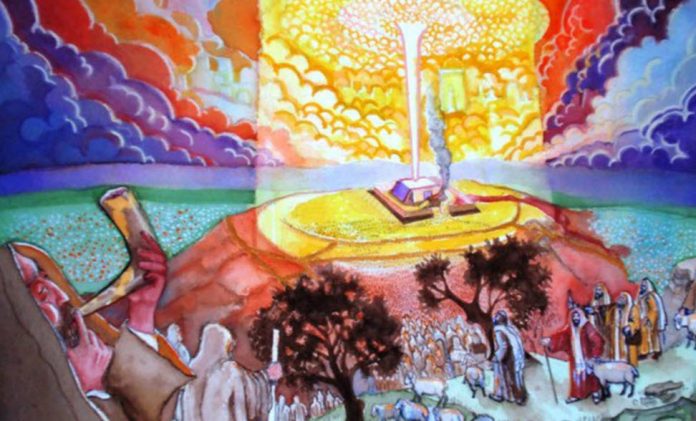Parashat Shmini is a section of the Torah that tells the story of the sudden death of Aaron’s sons and the laws of Kashrut. The Jews had been waiting for seven days, hoping for a sign from Hashem to show that their offerings had been accepted and their sins atoned. When the flame came down from the sky and consumed the animal offerings on the altar, the people fell on their faces with awe. Nadav and Avihu, the sons of Aaron, decided to offer incense without consulting Moses. They believed they were the next generation of Jewish leaders and wanted to show people the meaning of holiness. However, they overestimated themselves and this “self-righteous” attitude led to their misdeeds. Two rays of fire descended from heaven, entered their nostrils, and their holy souls departed, leaving their bodies intact.
Aaron remained silent and accepted God’s judgment, recognizing it as atonement for his own role in the Golden Calf. Aaron’s sons were chosen as a vehicle for atonement, which Moses confirmed as their greatness. Moses also stated that Aaron was about to lose all four sons, had Moses not brought partial forgiveness with his prayers.
The second half of the Book of Leviticus focuses on holiness, which means using the physical world as a means, not an end. The Jews can keep God’s presence in their midst even when they don’t have a Temple by being holy. The first step is to keep Kosher.
The prohibition against eating pork is not a logical law, but it is based on the basic Jewish belief that all physical matter is connected to spiritual roots. If the Almighty forbids certain animals, it must be that particular animal’s lifestyle is not the model that God wants the Jews to emulate. God wants the Jews to see themselves as being more than “sophisticated animals” scrounging for a meal. Benign animals such as chickens and cows are the kosher ones.
THE DEATH OF AARON’S SONS
Nadav and Avihu made a fatal mistake by offering incense without consulting Moses. As future Jewish leaders, they should not have decided on such an important issue without first consulting their uncle. They also never got married, thinking this would lower their ability to connect to the spiritual. These miscalculations are referred to as “bringing a strange fire to God.” Their “self-righteous” attitude was central to their misdeeds, and as future Jewish leaders, God held them to stricter standards.
Two rays of fire descended from heaven and entered their nostrils. Their holy souls departed and their bodies remained intact. Moses ordered the Levites to remove their bodies, but the family of Aaron continued with the dedication offerings, even though they were now mourners.
On the greatest day of Aaron’s life – being inaugurated as the High Priest of the Jews – the sudden death of his two sons was a heavy blow. In spite of it all, Aaron remained silent and accepted God’s judgment. Moses confirmed the greatness of Aaron’s two sons since they were chosen to be the vehicle for atonement. Moses also said that Aaron was about to lose all four sons, had Moses not brought partial forgiveness with his prayers.
LAWS OF KASHRUT
The laws of Kashrut are an essential part of the Jewish religion. Although many people have a hard time with “dietary laws” in general, it is important to understand that our eating habits play a central role in our lives and can influence our personalities in many ways. Kashrut is not primarily a “kitchen religion,” but a means of elevating materialism in the service of the Almighty.
The prohibition against eating pork is not a logical law, but rather it is based on the basic Jewish belief in following the commandments of God as expressed in the Torah. The laws of Kashrut also include rules about which animals are considered kosher, the method of slaughtering them, and the separation of meat and dairy products. These laws serve as a reminder of the importance of mindfulness in our everyday lives and help us to elevate our physical acts into spiritual ones. By adhering to the laws of Kashrut, Jews are reminded of their connection to God and the importance of living a life in accordance with His commandments.
The laws of kashrut also require that an animal be killed in a specific manner, known as shechita. This is a quick and painless method that ensures the animal feels no suffering. Additionally, the animal must be examined for any diseases that would make it unfit for consumption.
Keeping kosher is not just about following a set of rules. It is about recognizing that everything we do, including eating, can be an opportunity to connect with Hashem. By following these laws, we elevate the physical act of eating into a spiritual one.
OTHER LAWS OF HOLINESS
In addition to the laws of kashrut, the second half of the book of Leviticus also contains a variety of laws related to holiness. These include laws related to sexual morality, proper treatment of others, and observing the Sabbath and festivals.
One common thread throughout these laws is the idea that we must use the physical world in a way that is consistent with our spiritual values. For example, the laws related to sexual morality are intended to help us build strong, healthy relationships with our spouses while avoiding behaviors that are destructive or demeaning.
Similarly, the laws related to business ethics emphasize the importance of treating others fairly and honestly. This includes not taking advantage of others in business dealings, paying workers on time, and avoiding gossip or slander.
Finally, the laws related to observing the Sabbath and festivals remind us of the importance of taking time to rest and reflect on our spiritual values. By setting aside time for these activities, we can cultivate a deeper connection with Hashem and with our own inner selves.
CONCLUSION
The story of Aaron’s sons in Parashat Shmini reminds us of the importance of humility and respect for Hashem’s commands. By recognizing our own limitations and following the laws of holiness, we can strive to keep Hashem’s presence in our midst and live in a way that is consistent with our spiritual values.
The laws of kashrut are one important way to achieve this goal, as they remind us to elevate even the most mundane aspects of our lives into opportunities for connection with Hashem. By following these laws and other laws related to holiness, we can build a life that is both meaningful and fulfilling, both in this world and in the world to come.














